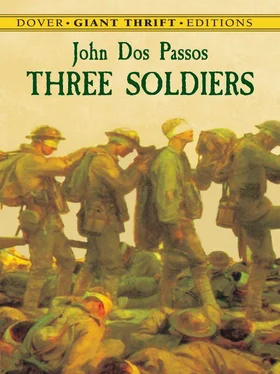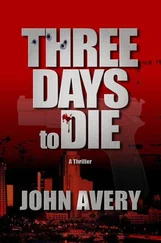“What division are you from?”
“Hell, I came to warn you this bastard frawg’s got soused an’ has been blabbin’ in the gin mill there how he was an anarchist an’ all that, an’ how he had an American deserter who was an anarchist an’ all that, an’ I said to myself: ‘That guy’ll git nabbed if he ain’t careful,’ so I cottoned up to the old frawg an’ said I’d go with him to see the camarade, an’ I think we’d better both of us make tracks out o’ this berg.”
“It’s damn decent. I’m sorry I was so suspicious. I was scared green when I first saw you.”
“You were goddam right to be. But why did yous take yer uniform off?”
“Come along, let’s beat it. I’ll tell you about that.”
Andrews shook hands with the old man and the old woman Rosaline had disappeared. “Goodnight… Thank you,” he said, and followed the other man across the gangplank.
As they walked away along the road they heard the old man’s voice roaring:
“Les bourgeois à la lanterne, nom de dieu!”
“My name’s Eddy Chambers,” said the American.
“Mine’s John Andrews.”
“How long’ve you been out?”
“Two days.”
Eddy let the air out through his teeth in a whistle.
“I got away from a labor battalion in Paris. They’d picked me up in Chartres without a pass.”
“Gee, I’ve been out a month an’ more. Was you infantry too?”
“Yes. I was in the School Detachment in Paris when I was picked up. But I never could get word to them. They just put me to work without a trial. Ever been in a labor battalion?”
“No, thank Gawd, they ain’t got my number yet.”
They were walking fast along a straight road across a plain under a clear star-powdered sky.
“I been out eight weeks yesterday. What’d you think o’ that?” said Eddy.
“Must have had plenty of money to go on.”
“I’ve been flat fifteen days.”
“How d’you work it?”
“I dunno. I juss work it though… Ye see, it was this way. The gang I was with went home when I was in hauspital, and the damn skunks put me in class A and was goin to send me to the Army of Occupation. Gawd, it made me sick, goin’ out to a new outfit where I didn’t know anybody, an’ all the rest of my bunch home walkin’ down Water Street with brass bands an’ reception committees an’ girls throwing kisses at ’em an’ all that. Where are yous goin’?”
“Paris.”
“Gee, I wouldn’t. Risky.”
“But I’ve got friends there. I can get hold of some money.”
“Looks like I hadn’t got a friend in the world. I wish I’d gone to that goddam outfit now… I ought to have been in the engineers all the time, anyway.”
“What did you do at home?”
“Carpenter.”
“But gosh, man, with a trade like that you can always make a living anywhere.”
“You’re goddam right, I could, but a guy has to live underground, like a rabbit, at this game. If I could git to a country where I could walk around like a man, I wouldn’t give a damn what happened. If the army ever moves out of here an’ the goddam M.P.’s, I’ll set up in business in one of these here little towns. I can parlee pretty well. I’d juss as soon marry a French girl an’ git to be a regular frawg myself. After the raw deal they’ve given me in the army, I don’t want to have nothin’ more to do with their damn country. Democracy!”
He cleared his throat and spat angrily on the road before him.
They walked on silently. Andrews was looking at the sky, picking out constellations he knew among the glittering masses of stars.
“Why don’t you try Spain or Italy?” he said after a while.
“Don’t know the lingo. No, I’m going to Scotland.”
“But how can you get there?”
“Crossing on the car ferries to England from Havre. I’ve talked to guys has done it.”
“But what’ll you do when you do get there?”
“How should I know? Live around best I can. What can a feller do when he don’t dare show his face in the street?”
“Anyway, it makes you feel as if you had some guts in you to be out on your own this way,” cried Andrews boisterously.
“Wait till you’ve been at it two months, boy, and you’ll think what I’m tellin’ yer… The army’s hell when you’re in it; but it’s a hell of a lot worse when you’re out of it, at the wrong end.”
“It’s a great night, anyway,” said Andrews. “Looks like we ought to be findin’ a haystack to sleep in.”
“It’ld be different,” burst out Andrews, suddenly, “if I didn’t have friends here.”
“O, you’ve met up with a girl, have you?” asked Eddy ironically.
“Yes. The thing is we really get along together, besides all the rest.”
Eddy snorted.
“I bet you ain’t ever even kissed her,” he said. “Gee, I’ve had buddies has met up with that friendly kind. I know a guy married one, an’ found out after two weeks.
“It’s silly to talk about it. I can’t explain it… It gives you confidence in anything to feel there’s someone who’ll always understand anything you do.”
“I s’pose you’re goin’ to git married.”
“I don’t see why. That would spoil everything.”
Eddy whistled softly.
They walked along briskly without speaking for a long time, their steps ringing on the hard road, while the dome of the sky shimmered above their heads. And from the ditches came the singsong shrilling of toads. For the first time in months Andrews felt himself bubbling with a spirit of joyous adventure. The rhythm of the three green horsemen that was to have been the prelude to the Queen of Sheba began rollicking through his head.
“But, Eddy, this is wonderful. It’s us against the universe,” he said in a boisterous voice.
“You wait,” said Eddy.
When Andrews walked by the M.P. at the Gare St. Lazare, his hands were cold with fear. The M. P. did not look at him. He stopped on the crowded pavement a little way from the station and stared into a mirror in a shop window. Unshaven, with a check cap on the side of his head and his corduroy trousers, he looked like a young workman who had been out of work for a month.
“Gee, clothes do make a difference,” he said to himself. He smiled when he thought how shocked Walters would be when he turned up in that rig, and started walking with leisurely stride across Paris, where everything bustled and jingled with early morning, where from every café came a hot smell of coffee, and fresh bread steamed in the windows of the bakeries. He still had three francs in his pocket. On a side street the fumes of coffee roasting attracted him into a small bar. Several men were arguing boisterously at the end of the bar. One of them turned a ruddy, tow-whiskered face to Andrews and said:
“Et toi, tu vas chômer le premier mai?”
“I’m on strike already,” answered Andrews laughing.
The man noticed his accent, looked at him sharply a second, and turned back to the conversation, lowering his voice as he did so. Andrews drank down his coffee and left the bar, his heart pounding. He could not help glancing back over his shoulder now and then to see if he was being followed. At a corner he stopped with his fists clenched and leaned a second against a house wall.
“Where’s your nerve. Where’s your nerve?” He was saying to himself.
He strode off suddenly, full of bitter determination not to turn round again. He tried to occupy his mind with plans. Let’s see, what should he do? First he’d go to his room and look up old Henslowe and Walters. Then he would go to see Geneviève. Then he’d work, work, forget everything in his work, until the army should go back to America and there should be no more uniforms on the streets. And as for the future, what did he care about the future?
Читать дальше












